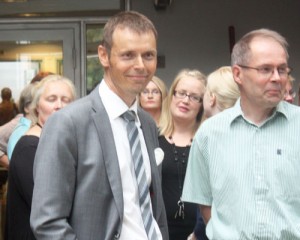
At the celebration of EE-house 10-year anniversary. In front: Olli Peltoniemi and Raimo Pohjanvirta.
Veterinary science at the international top
The past year’s best science and research news was published in the autumn, when the Academy of Finland announced that veterinary research placed at the top of its ranking of all fields of academic research in the State of Scientific Research report. The ranking compared the discipline to the international level of its field based on citation frequencey. Veterinary medicine has improved steadily its ranking over the past decade and is currently at the top of the approximately 30 fields of research currently pursued in Finland. From this we can conclude that the research we do in our Faculty has an important impact: researchers around the world read our research results and frequently cite them.
A record number (18) of public defences of doctoral dissertations also made 2014 a busy year for the Faculty of Veterinary Medicine. Eight of these defences were for a Doctor of Veterinary Medicine degree, and ten were for a Doctor of Philosophy degree.
DVM Laura Hänninen was nominated as Helsinki University’s Docent of the year in 2014. Hänninen was earlier on nominated as Docent of ethology in the Faculty of Veterinary Medicine in 2011. Hänninen is a very merited researcher on animal welfare issues. She has published around 30 original research articles on related international research publications. Docent Hänninen is supervising currently seven doctoral thesis. She is active in several international and national positions of responsibility. Hänninen is a popular speaker and has been interviewed numerous times regarding her research field. She has been acting in a meritious manner as Docent representing the University of Helsinki both in Finland and abroad.
One of the most important events of 2014 for research at the Faculty of Veterinary Medicine was the reform of doctoral education at the University of Helsinki. At the University level, the new system created four doctoral schools offering a total of 31 doctoral programmes. The Faculty was put in charge of two of these programmes: the Doctoral Programme in Food Chain and Health, and the Doctoral Programme in Clinical Veterinary Medicine. In addition, the Faculty cooperates with many other doctoral programmes coordinated by several faculties.
| Doctoral programme | Faculty of Veterinary Medicine | Faculty of Medicine | Faculty of Biological and Environmental Sciences | Faculty of Agriculture and Forestry | TOTAL |
| DPCVM, clinical veterinary medicine | 75 | 4 | 79 | ||
| Food Chain and Health | 38 | 38 | 76 | ||
| Integrative Life Science | 8 | 28 | 119 | 6 | 168 |
| Microbiology and Biotechnology | 7 | 7 | 16 | 44 | 74 |
| Brain and Mind | 1 | 27 | 28 | 60 |
Table: The division of doctoral students of the Faculty of Veterinary Medicine and three other faculties into doctoral programmes, as of 28 May 2014.* The table shows those doctoral programmes which feature only the Faculty’s doctoral students; the doctoral students of other faculties have been excluded. The total indicates the total number of doctoral students in the programme from all faculties.
As of the beginning of 2014, every doctoral student belongs to a doctoral programme. The tasks of the doctoral programme include coordinating doctoral education in research groups, providing field-specific courses for doctoral students, and granting the programme’s doctoral education places to doctoral students.
The doctoral schools coordinate the doctoral programmes, organise non-specialist courses and distribute resources to programmes in order to enable them to organise courses, expert visits, and other activities as well as to pay the salaries of doctoral students.
The Faculty’s duties include granting the postgraduate study right at the beginning of doctoral studies and the permission to print the dissertation near its completion as well as grading the dissertation. This means that, together with the doctoral programmes, the Faculty is partially responsible for the quality of doctoral degrees in its field.
All participants in the new system must cooperate with each other. The Faculty’s goal is to support new doctoral students and research groups and to continue to work flexibly and efficiently as the system develops. Many questions about operating methods and routines arose during the restructuring of doctoral education, and at the time of writing, some routines and practices are not yet fully established. A willingness to cooperate is a necessity for the new system to function properly.
Olli Peltoniemi
Vice-dean, research affairs
UH, Faculty of Veterinary Medicine